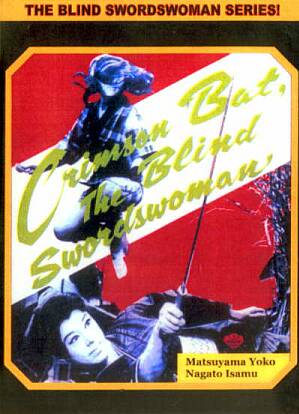★★★
 We meet our heroine Oichi as a young child, who has just been being abandoned by her mother – not sure what happened to father, but we later discover Mom’s a prostitute, so can probably fill in the blanks ourselves. To make matters worse, the tree under which Oichi takes shelter from a storm is struck by lightning, rendering her totally blind, in a way that’s – probably wisely – left medically unexplained. However, she is then taken in by a kind gentleman, who brings her up, and on into adulthood.
We meet our heroine Oichi as a young child, who has just been being abandoned by her mother – not sure what happened to father, but we later discover Mom’s a prostitute, so can probably fill in the blanks ourselves. To make matters worse, the tree under which Oichi takes shelter from a storm is struck by lightning, rendering her totally blind, in a way that’s – probably wisely – left medically unexplained. However, she is then taken in by a kind gentleman, who brings her up, and on into adulthood.
She’s no luckier with her foster parent, who is murdered by a former associate, Devil Denzou (Amatsu); she is saved from the same fate by a wandering samurai. He sees her potential and trains her in the way of the sword, to the point where she has surpassed him. But she mentions the M-word – “marriage” – and he, too, exits like a, er, bat out of hell. On subsequent travels, she uses her skills to save yet another man from being lynched, and eventually, all these disparate plot threads join up, more or less. Though others, such as the woman with a killer yo-yo [GoGo Yubari’s ancestor?] just kinda drift out of the plot.
The film is at its best when there is the threat of violence; much like Sergio Leone, the lead-up lasts much longer than the actual acts, with the director ratcheting up the tension. For example, there’s one scene where Oichi visits a gambling parlour to raise money, and from the moment she sits down, you know it’s just a matter of time before her sword comes out of its red sheath (which presumably is the origin of her name – that, and the copious blood that tends to get sprayed when she’s around). There’s also a nice visual sense at work throughout here, particularly in lighting, which enhances proceedings nicely.
And, being honest, the actual drama needs all the help it can get, since it seems limp in comparison, though allowance should likely be made for the dubbing. That, however, can’t explain the bouncing back and forth in time, which may induce temporal nausea in susceptible viewers; it feels as if the finished film got tossed in the air and is shown in the order it hit the ground. And while there’s a decent “ah-hah!” when everything ties up, this isn’t enough to justify the lengthy set-up. Fewer plot threads, explored in depth, would be a major improvement.
Dir: Matsuda Teiki
Star: Yoko Matsuyama, Isamu Nagato, Jun Tatara, Satoshi Amatsu
a.k.a. Mekura No Oichi Monogatari: Makkana Nagaredoni




